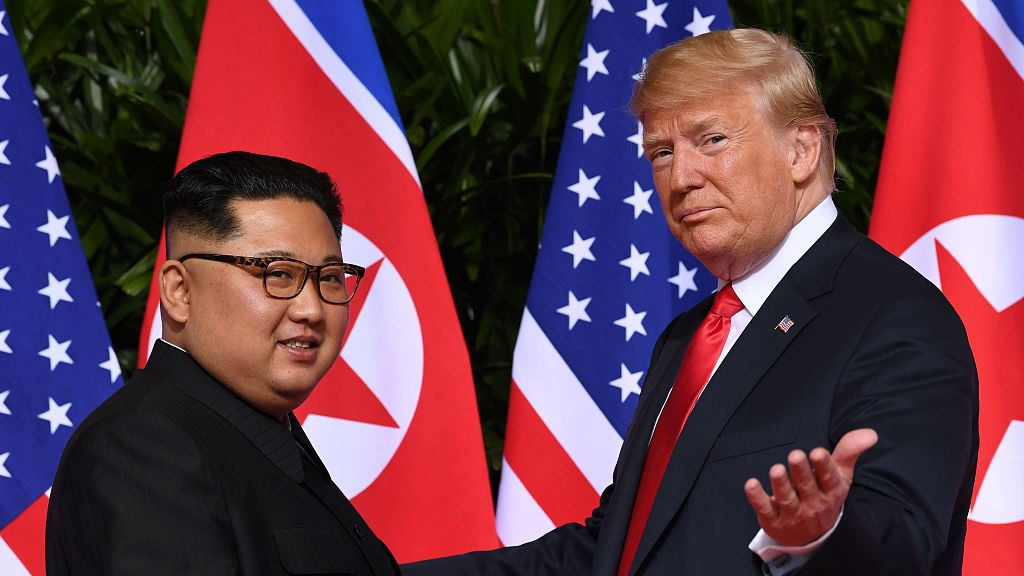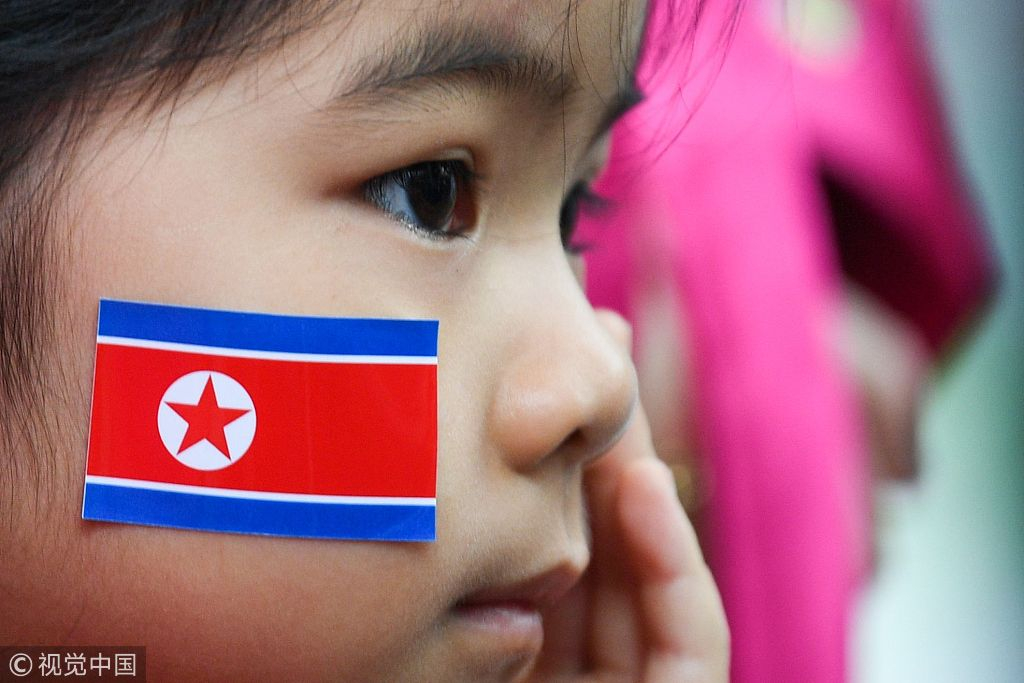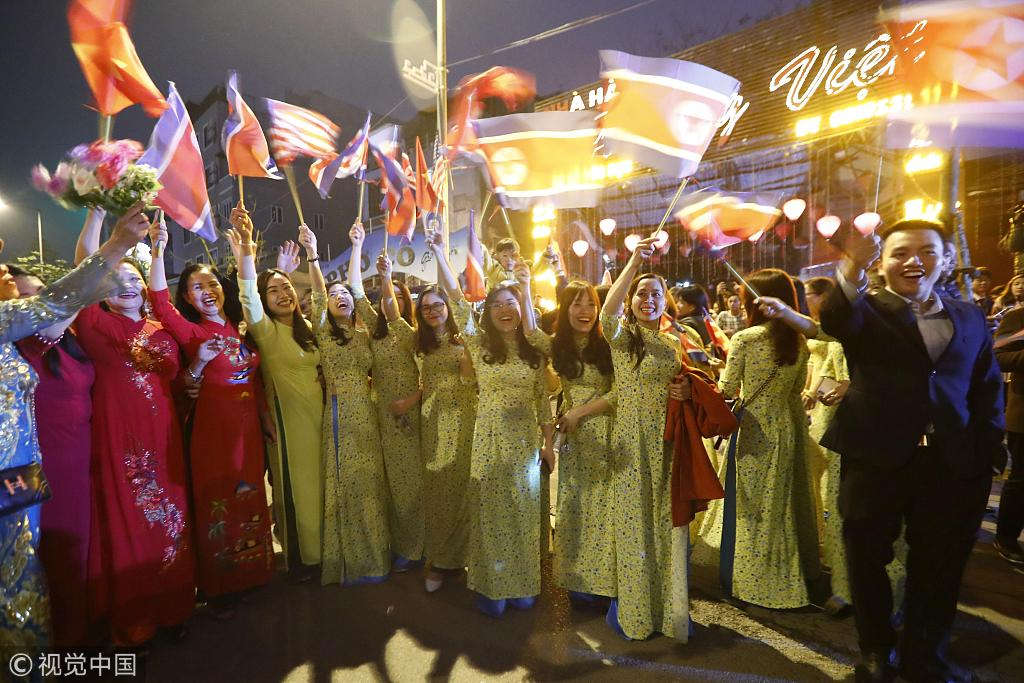
Opinion
12:09, 27-Feb-2019
Kim Jong Un on nuclear and economic tightrope
Updated
11:46, 28-Feb-2019
Da Zhigang

Editor's Note: Da Zhigang is director and research fellow of the Northeast Asia Research Institute at Heilongjiang Provincial Academy of Social Sciences. The article reflects the author's opinion and not necessarily the views of CGTN.
DPRK leader Kim Jong Un and U.S. President Donald Trump are meeting in Hanoi this week to continue talks on nuclear capabilities. There are both optimistic expectations and pessimistic views on whether their talks can push the Korean Peninsula towards denuclearization.
Optimists believe that, given the DPRK announcement last year that it would shift its strategic focus to economic development, the country will probably make some concessions on giving up its nuclear weapons during this summit in exchange for the lifting of sanctions and the declaration of the end of the war on the Peninsula. After all, denuclearization is an irreversible trend.
Pessimists point out that no matter how much pressure the U.S. exerts, DPRK, driven by its own security and institutional considerations, will not divulge its nuclear capabilities, let alone give them up without anything in return. Therefore, there is still a long way to go to realize denuclearization.
The summit may produce a limited outcome that meets the basic needs of both sides, but there will be no dramatic turnaround. From DPRK's perspective, no one, including Kim Jong Un, will shift the country's strategic focus to economic development at the expense of national security and institutional transformation.
Idealistic and hasty approaches are not in line with the reality that DPRK is trying to consolidate its diplomatic advantages and stabilize its domestic situation.

A child waits outside the Vietnam-DPRK Friendship Kindergarten school in Hanoi ahead of the second Kim-Trump summit, February 27, 2019. /VCG Photo
A child waits outside the Vietnam-DPRK Friendship Kindergarten school in Hanoi ahead of the second Kim-Trump summit, February 27, 2019. /VCG Photo
For the U.S., even if it has not abandoned its package of complete denuclearization strategies, there are signs that it may be prepared to accept DPRK's phased denuclearization.
After the Kim-Trump Singapore summit, the game between the DPRK and the United States has evolved into a contest of patience on the nuclear and economic tightrope.
Kim Jong Un, balancing at one end, seems to be in a better place, but he is in fact faced with a growing challenge.
The DPRK would be pleased to preserve its nuclear capabilities while paving the way for economic transformation so as to balance its national security and economic development.
Despite pressure at home and abroad, the DPRK will strive to realize economic development in the short term and denuclearization in the long run. To begin with, the gradual approach to denuclearization buys more time for the DPRK to transition and adapt.
The DPRK's gradual denuclearization approach is not only a manifestation of its distrust in the U.S. but also the most effective way to find out whether the U.S. has indeed abandoned its hostile policy towards the DPRK. It is also a buffer for the DPRK to maintain national and institutional security.
Moreover, the DPRK is eager for real benefits from phased denuclearization. The country expects to see the United Nations lift sanctions against it as soon as possible and issue a binding declaration of the end of the war and the establishment of a peace mechanism on the peninsula. The U.S. should support the DPRK's economic development.

Vietnamese citizens welcome U.S. President Donald Trump in their traditional costumes on the street of Hanoi, February 26, 2019. /VCG Photo
Vietnamese citizens welcome U.S. President Donald Trump in their traditional costumes on the street of Hanoi, February 26, 2019. /VCG Photo
The DPRK has repeatedly expounded its strong will for the complete denuclearization of the peninsula. This should be rewarded with energy assistance and the implementation of the development plan on the Korean Peninsula.
The ROK, Japan, and other countries should take the prices that the DPRK would pay for denuclearization into full account in their bilateral and multilateral energy assistance and transportation cooperation on the peninsula.
Relying on diplomatic means to promote gradual denuclearization is a necessary choice for the DPRK to seek a balance between nuclear weapons and economic development, and is also the ultimate path to complete denuclearization.
The transition to the complete denuclearization depends on the continued improvement of the DPRK's internal and external security situation, in particular, the complete reversal of Washington's hostility to the DPRK.
Whether the compensation to the DPRK is attractive enough and whether the multilateral mechanisms among Northeast Asian stakeholders are supportive enough are of pivotal importance as well.
The DPRK may make further concessions on the Kim-Trump Vietnam meeting, but dancing on the nuclear and economic tightrope is still a vital strategy for the DPRK to win the initiative and gain an edge in the future.
The DPRK is unlikely to give up its nuclear weapons voluntarily, but it is unrealistic to force it to abandon its nuclear pursuits entirely at the current stage.
Cover photo: U.S. President Donald Trump meets with DPRK leader Kim Jong Un in their historic summit at the Capella Hotel on Sentosa Island, Singapore, June 11, 2018. /VCG Photo
(If you want to contribute and have specific expertise, please contact us at opinions@cgtn.com.)

SITEMAP
Copyright © 2018 CGTN. Beijing ICP prepared NO.16065310-3
Copyright © 2018 CGTN. Beijing ICP prepared NO.16065310-3